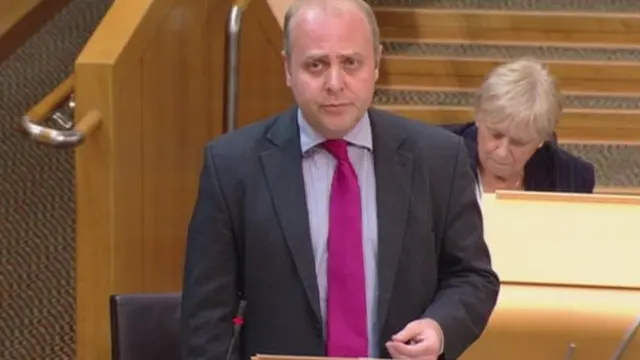Good eveningpublished at 17:59 BST 24 September 2014
 Sandy Murray
Sandy Murray
BBC Scotland news
That's it for our live coverage today. It all begins again on Thursday morning at 07:00.
Nicola Sturgeon to run for SNP leader job
Move will trigger SNP deputy leadership contest
Agreement on new powers for Scotland 'not easy', says Lord Smith
Scotland rejected independence in last Thursday's historic referendum by 55% to 45%
Graham Fraser, Nick Eardley, Sandy Murray and Tom Moseley
 Sandy Murray
Sandy Murray
BBC Scotland news
That's it for our live coverage today. It all begins again on Thursday morning at 07:00.
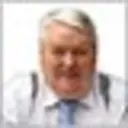 Brian Taylor
Brian Taylor
Political editor, Scotland
Nicola Sturgeon will face many challenges ahead - on the realistic presumption that she is elected SNP leader and thus First Minister.
Not, incidentally, that she was making any such presumption today: her linguistic tense was uniformly conditional.
To add to those structural challenges, a transient one. Ms Sturgeon's voice was discernibly struggling after the rigours of the referendum.
Facing a comparable challenge, I tendered a comradely throat pastille. (For the avoidance of any doubt, I would do likewise for any other politician from any other party. Laryngitis knows no boundaries.)
Deputy Labour leader Harriet Harman, in her closing speech to the party conference, mocked David Cameron - who was recorded saying the Queen "purred" down the phone to him when he called her with the result of the Scottish referendum.
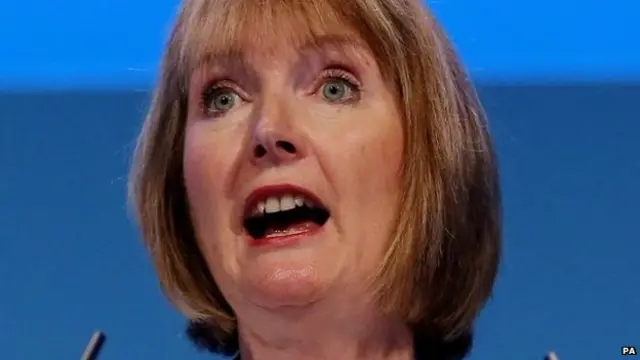 Image source, PA
Image source, PAMs Harman told delegates: "Sometimes it's like we have got David Brent as our prime minister."
Iain Macwhirter, external: Nicola Sturgeon says she will be in "higher heels" following Alex Salmond's "big boots". Elegant way of saying he's heavy handed..#indyref
Lars G Ekstrom says: I think the big losers in this referendum will be the no-voters. Westminster politicians will peddle back on their vows before the referendum and Scotland will get fewer additional powers than you were lead to believe. And, what you get will be watered down.
And, in three years time Scotland may well be leaving the EU with the rest of the United Kingdom because of the English voters.
Ed Miliband has been speaking to BBC Scotland at his party conference in Manchester, saying he is "optimistic" about Labour's chances in Scotland at next year's general election and the Holyrood election in 2016.
He also praised Scottish Labour leader Johann Lamont.
Former Prime Minister Gordon Brown played an "incredible role" in the campaign to save the Union, he added.
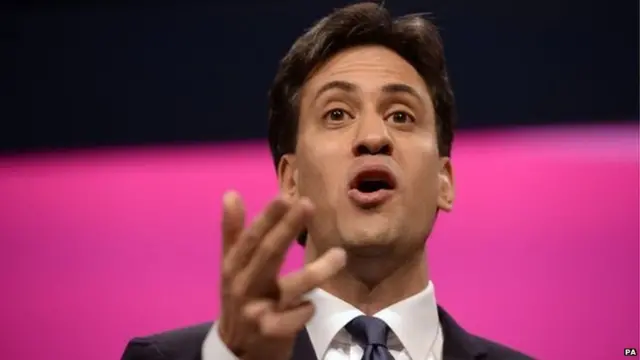 Image source, PA
Image source, PAStephen Canning says: After what the referendum achieved, I cannot believe someone is asking what it cost and who paid for it. It's like saying "let's not have a democracy because it costs too much". I think everyone in the UK has benefitted to a great extent, except perhaps Westminster, so who paid for it is in my view also irrelevant.
Winding up the debate in the Scottish Parliament, Finance Secretary John Swinney says everyone in the chamber has agreed on the engagement of 16 and 17 year olds and their contribution to the electoral process.
But, he says: "We don't have the legislative power in this Parliament to effect what every single one of us agrees is the right thing to do."
In his closing remarks, he says the referendum was "an exercise in significant democratic participation".
He adds: "The people came to their conclusion, this government accepts that conclusion, but what we will also do is continue to be ambitious for the people of Scotland, to deliver the very best that we can do."
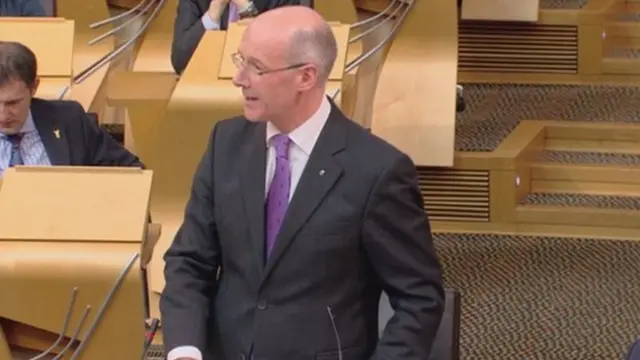
John McGlynn says: I think George Chappell probably meant 'Country' and not 'County' in describing Scotland although come to think it, a 'County' is pretty much all we're considered to be by Messrs Cameron and Milliband, so he's probably right. Look - it's simple. If the infamous 'Vow' is not delivered to the people of Scotland on terms it finds favourable then the SNP has every right to go for a referendum just as soon as they like.
East Lothian Labour MSP Iain Gray says the 55% of the vote who backed retaining Scotland as part of the UK must be heard and "we must accept their decision or we treat them with contempt".
Mr Gray says "it is quite wrong to say 'No' voters were tricked by promises of new powers" adding it could easily be said the 'Yes' campaign had tricked the voters over exaggerated oil revenues and promises.
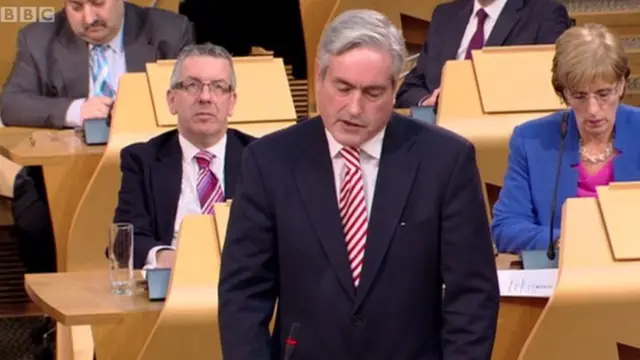
Conservative MSP for West Scotland Jackson Carlaw says the referendum result was an "emphatic" defeat for independence, comparing it with famous landslide election results of years gone by.
"The 85% of Scots who spoke now stand at odds with the 50% who voted for this Parliament," he says.
Green MSP Alison Johnstone, who represents Lothian, says social media was "invaluable" to the 'Yes' campaign.
"It helped level what was a very unlevel playing field in terms of support from the corporate print media," she says.
She adds: "Debate in Scotland has flourished because of, not in spite of, the diversity of speakers in both the 'Yes' and 'No' campaigns."
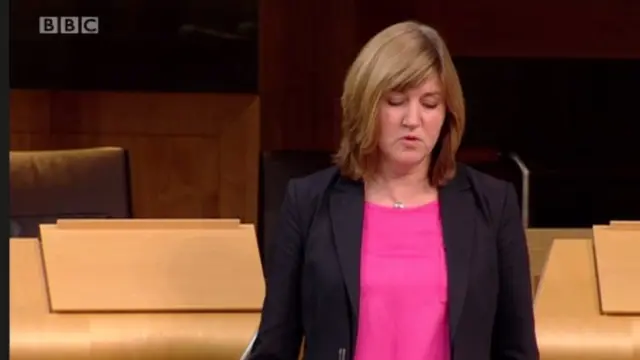
Alison McInnes, Liberal Democrat MSP for North East Scotland, says Alex Salmond "should be speaking on behalf of all Scots and abiding by the Edinburgh agreement."
"There should be no more stoking of the fires of division," she adds.
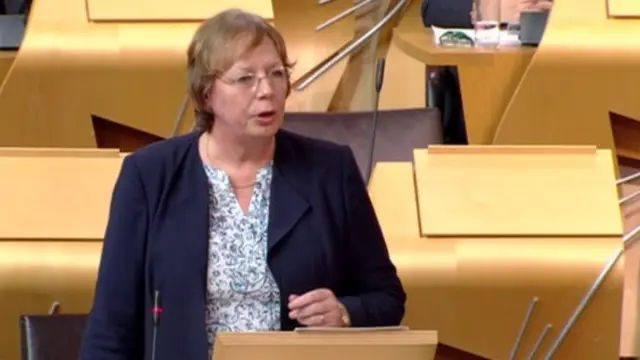
 Robert Peston
Robert Peston
Economics editor
It did not feature much on the conference platform, but in the hurly burly of Labour's conference in Manchester the so-called English question loomed large - or what impact the planned, if vague, new constitutional settlement for Scotland should have on the way England is governed (and Wales and Northern Ireland too).
I stumbled on three themes.
One was the fury of Ed Miliband and his close circle with the prime minister - at what they saw as a cynical and short-termist attempt to turn English unease at the fiscal privileges going to Scotland into new voting procedures in the Commons that would favour the Tories.
A senior Labour official told me he didn't see how Ed Miliband could now negotiate the detail of Scotland's new budgetary arrangements with David Cameron, given the collapse of trust between the two.
All of which will increase the unease of Scottish nationalists that they may have been sold a hobbled pup of putative enhanced devolution by the main unionist parties in the closing days of the battle over whether Scotland would break free of the UK.
Last up before the closing speeches in the Scottish Parliament is Colin Beattie, SNP MSP for Midlothian North and Musselburgh, who praises the 'Yes' campaign.
"That we were unable to achieve independence this time around speaks not of any failings, but more of the desperate and frankly sometimes unsavoury tactics of Westminster, who had foolishly assumed the 'No' vote was in the bag."
Labour MSP Hugh Henry, who represents Renfrewshire South, says: "It feels as though I am sitting in a therapy session for a support group for people who are really suffering."
It is "only natural" for SNP members to feel disappointed, he says: "It will take some time for some of that to work through."
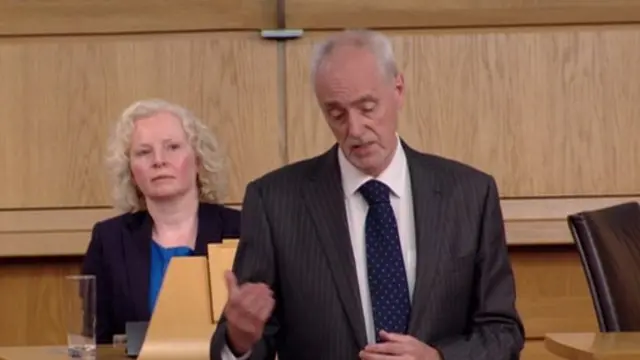
Alan Cameron says: As a non-member of any party, and a fully paid up cynic, I would suggest to the SNP to subtly change their name, and add a softer aim for the membership card. That would probably reflect the vast majority of people who support them in Holyrood, but find Independence - at the moment - a step too far. Home Rule by stealth is fine for me.
Mark Davies says: If the SNP do insist on another referendum I suspect they would go ahead without the agreement of whoever was the UK government. If that was the case I would suggest there is no 'NO' campaign and 'NO' voters simply do not vote. The result could hardly then be called a mandate, or democracy in action.
Bob Doris, SNP MSP for Glasgow, says he accepts the Scottish people's verdict that "as yet, they are not ready for Scottish independence".
He accuses Labour of "demonising" Alex Salmond and the 'Yes' movement.
On the pledge of new powers from Westminster, he adds: "If vows are broken, a new mandate should be sought".
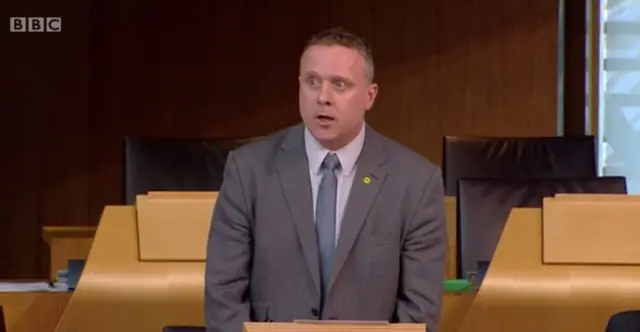
Business and economy editor Douglas Fraser is answering questions on our facebook page, external.
Carrie Harrold asked: What affect might the continued bickering about independence and inferences from SNP of another referendum have upon investment, employment and economic growth?
Douglas Fraser replied: That looks to me like a rhetorical question. Bear in mind that some investment sectors held up well through the referendum campaign, notably in offshore oil and gas.
Read Douglas's answers in full here, external.
Scottish Conservative MSP Gavin Brown says if Scotland and the UK are to get the best out of Lord Smith of Kelvin's devolution commission, it will require the goodwill of all the Union parties, the Scottish Government and the Scottish Green Party.
Mr Brown says it is "critical" the Scottish Government means what they say when they say they are going to participate fully".
